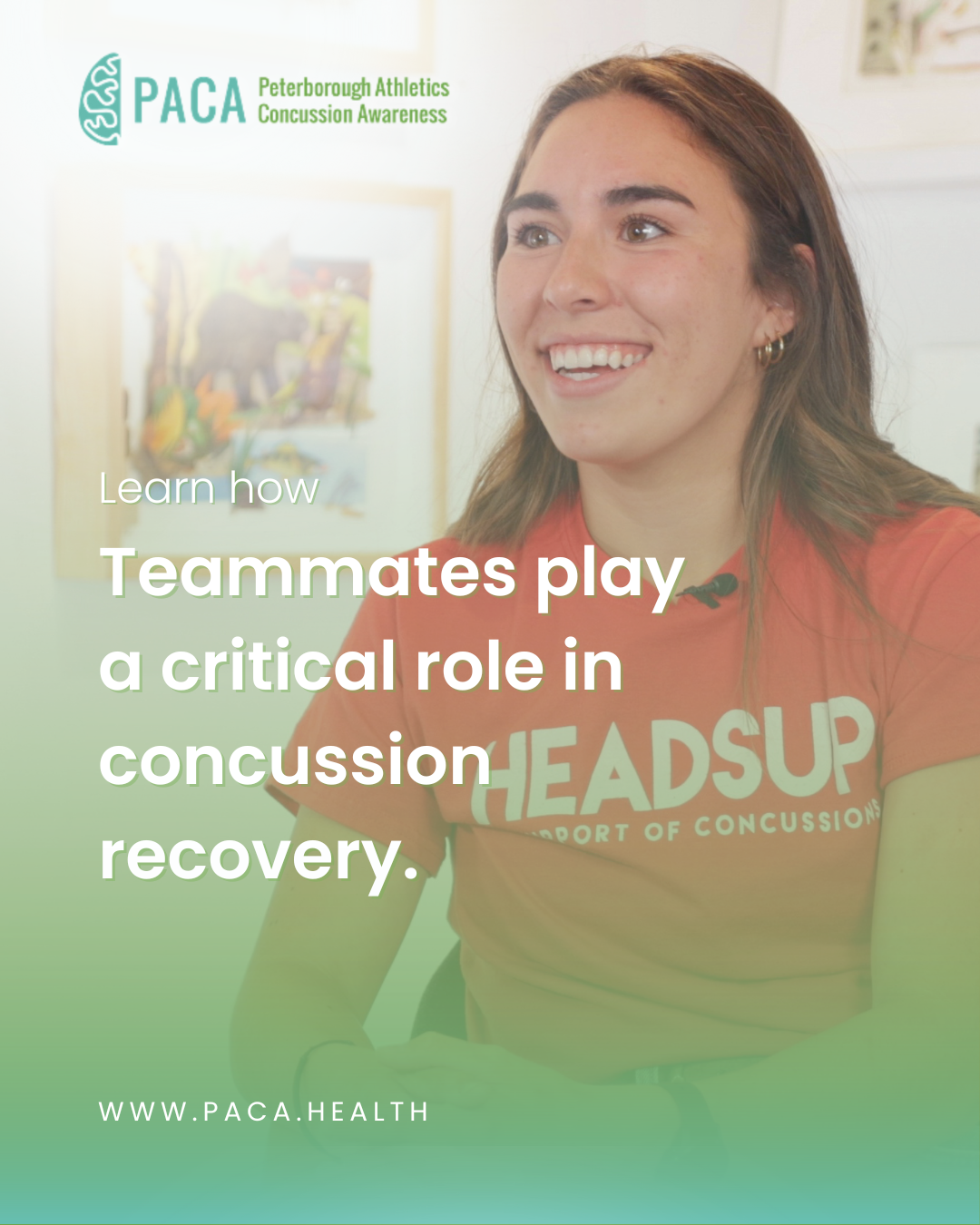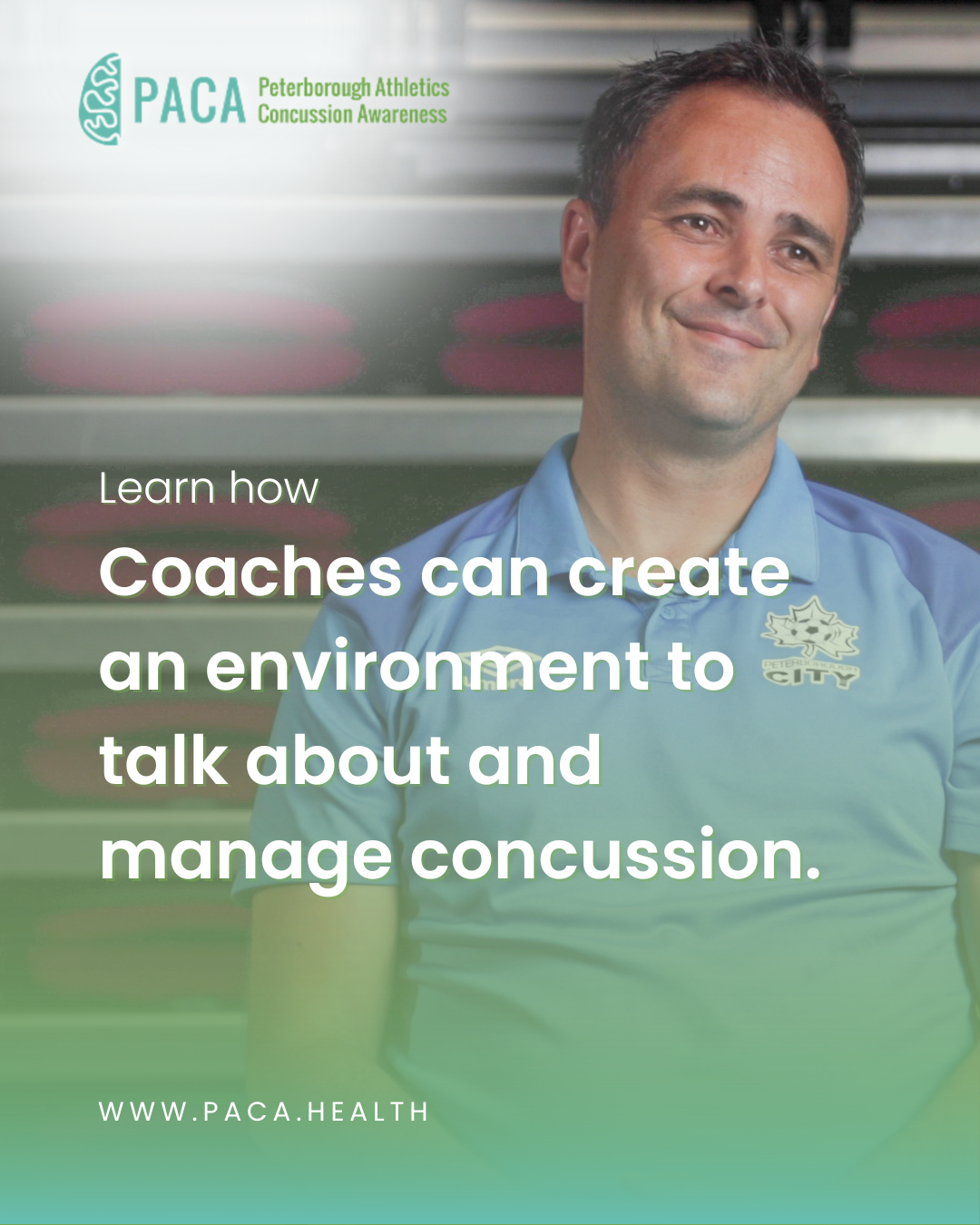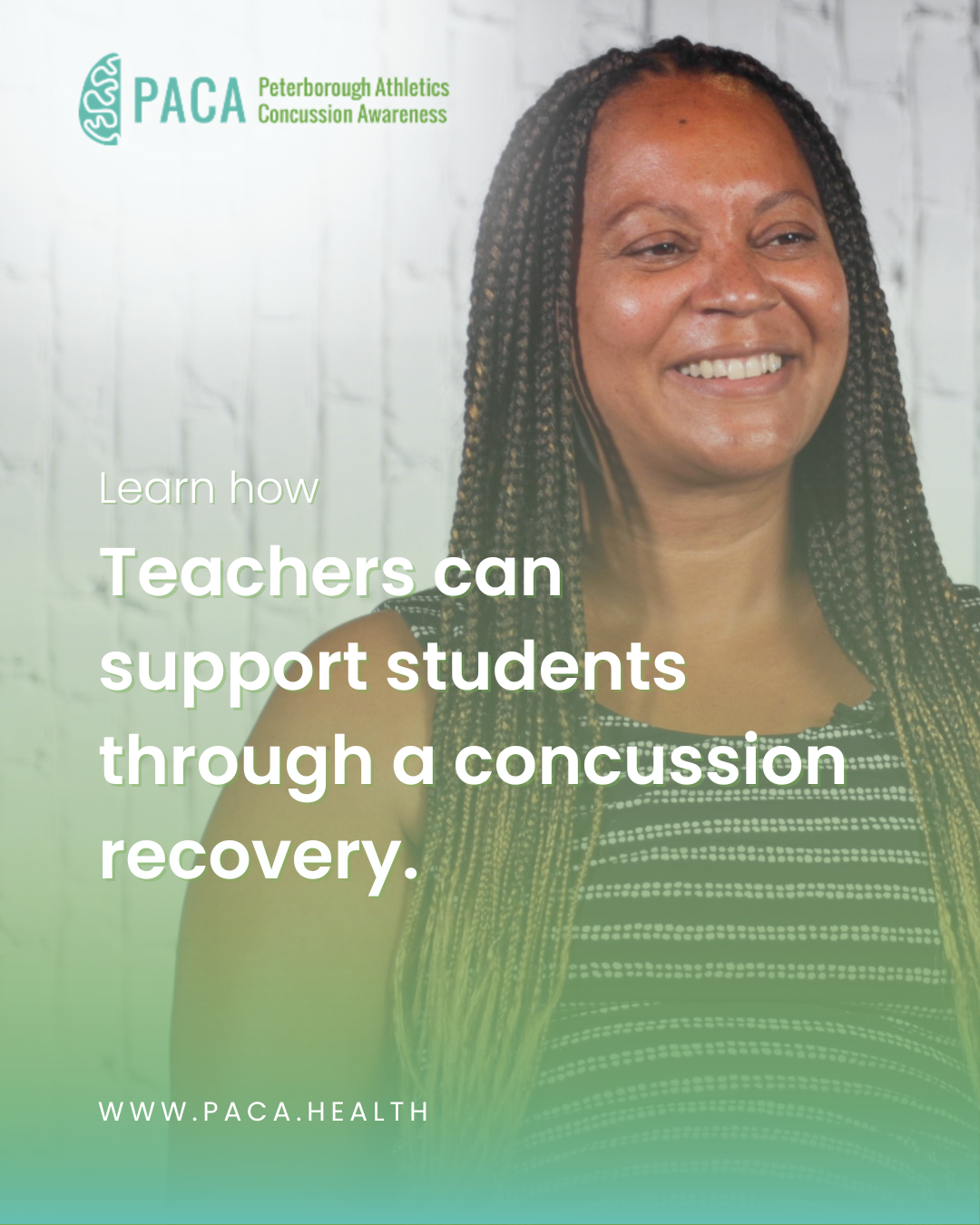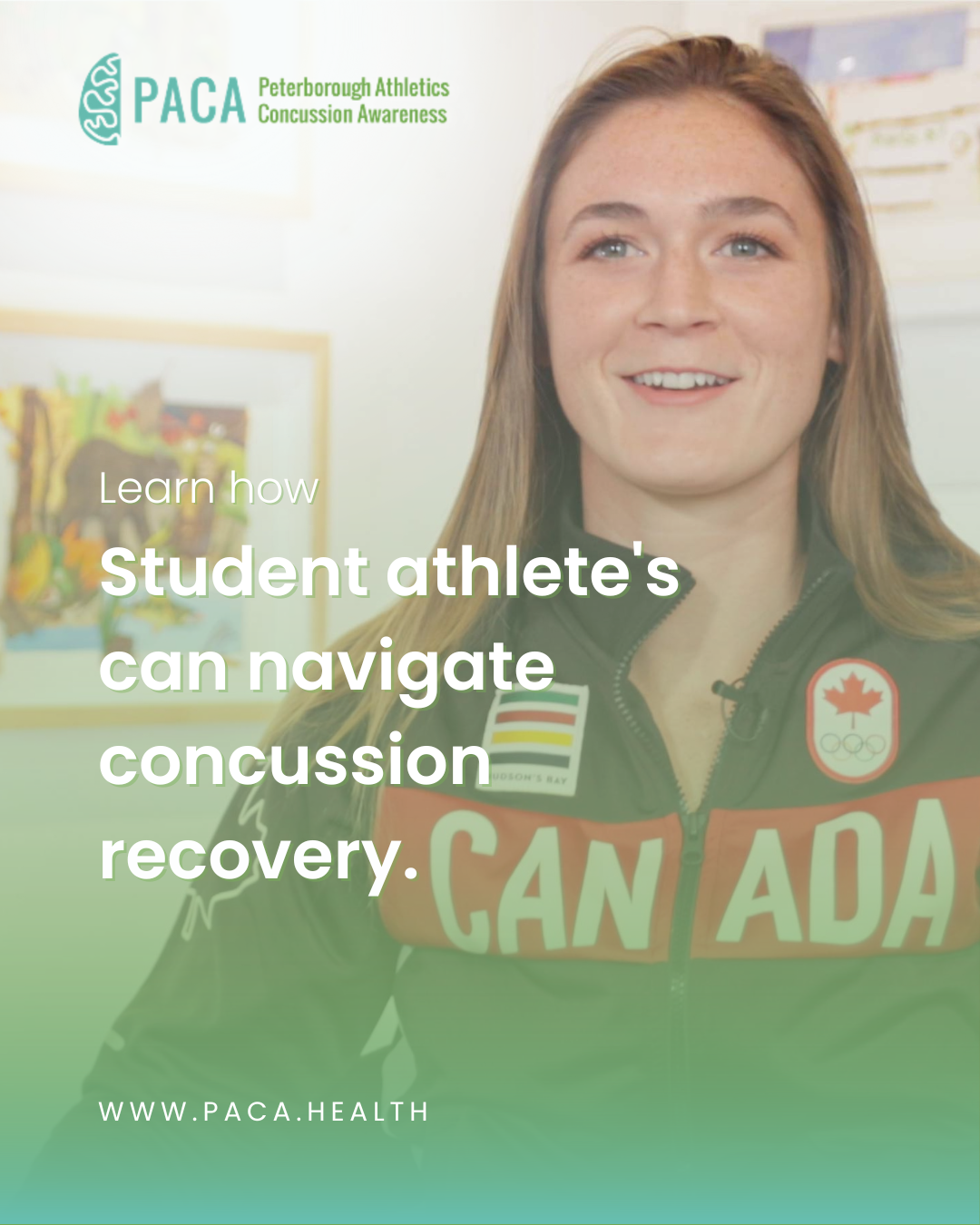Education Programs
RECOGNIZE, REMOVE, MANAGE, PREVENT – Educational Docuseries
We are thrilled to unveil an impactful video docuseries that explores the critical aspects of concussions in sports: Recognize, Remove, Manage, and Prevent. Focusing specifically on Peterborough’s sports scene, this community-led project spearheaded by PACA aims to position our city as a trailblazer in concussion education and awareness, with the ultimate goal of inspiring other communities nationwide.
Our purpose in creating this docuseries stemmed from the need for a locally accessible, engaging concussion resource. By addressing the concerns of students, teachers, parents, coaches, and sport administrators, we aim to foster a comprehensive understanding of the importance of taking concussions seriously and ensuring the safety of our athletes.
These transformative videos will be available free of charge on Rowan’s Law Day, September 28th, 2022. Join us as we empower our community, raise awareness, and make a lasting impact in the realm of sports-related concussions. Together, let’s pave the way for safer athletic experiences for all.
Click here to be notified about PACA Concussion Awareness Week Activities 2023
Recognize
Being able to recognize a concussion can often be a difficult task. Sometimes the injury may be obvious to everyone around and other times symptoms some athletes may experience their symptoms presenting a few days after the initial contact. With this level of complexity it is imperative that all sport stakeholders understand the important role of being able to recognize a concussion in real time.
Our Recognize, Remove, Manage, Prevent docuseries concussion education resource brings to life real stories from our community that showcase the various challenges involved with recognizing a concussion. Click the YouTube link above to learn more.
Remove
Knowing when to remove an athlete from play is one of the most critical aspects of a concussion recovery. The culture created by coaches, parents and sport administration set the table for how our athletes respond to the injury. Certain barriers related to in-game situations and the importance of the game may arise, but ultimately the health of the athlete is, and should be the number one priority. Each sport stakeholder is responsible for speaking up if they suspect a concussion. Click the YouTube link above to learn more
Manage
Once a concussion is sustained, managing it can pose many challenges. Inherently, a concussion is an invisible injury that is often unpredictable throughout the recovery process. Not only is the injury difficult to navigate for the individual who sustains it, unique challenges are presented for support systems as well.
The individualistic complexities of managing a concussion was one of the main reasons why we decided to create this resource. The Recognize, Remove, Manage, Prevent docuseries brings to light stories of people who have been there before and who have navigated through a concussion. The insights shared in this series will help provide a greater understanding of the unique challenges that the injury presents. Our goal is to better prepare all sport stakeholders for their respective roles in recovery so our athletes can come back to the sport they love faster. Click the YouTube link above to learn more.
Prevent
The final piece to the puzzle is understanding how we can actually prevent concussions from happening to our athletes.
There are three types of concussion prevention: Primary prevention is averting a concussion before it happens (rule changes, policy, equipment innovations), Secondary Prevention aims to reduce the effects of the injury when it does occur (early recognition and removal from sport, protocols, community support), and Tertiary Prevention attempts to lessen the long term consequences of the injury (prolonged concussion symptoms, creating a health based value system).
Learn the tools you need to understand if your sport organization is doing enough to prevent concussions. Each of these aspects of prevention are crucial to the future of our youth and sport. Collectively, our voices can inspire positive change. Click the YouTube link above to learn more.
Learn more about your role in supporting concussions in your sporting community

As a Teammate
Teammates have many roles when supporting a teammate through their concussion recovery. Not only do teammates have a duty to speak up if they suspect a concussion, they can also help provide support to an injured teammate. Keeping in contact daily, providing an open, judgment-free space to chat, hanging out in silence and keeping them included in social activities (in person or from a far) are all great places to start..

As a Parent
Parents are the backbone of a student athlete’s concussion recovery. The more they are able to understand the needs of their child the more likely positive outcomes will persist. Being informed about best practices, sport policy and protocols, and your child’s mental and physical health can contribute to a more positive experience with the injury. Don’t wait to learn about concussions until after it happens, be proactive and learn how to protect your children today by utilizing PACA’s resource page and educational content!

As a Coach
Coaches play an integral role in setting an environment for athletes to understand the risks and proper protocols around concussions. It is imperative that coaches create an environment that is safe, judgment free, and present clear expectations to the team when it comes to injury. This influence will impact all members of the team, injured or not. Given the complexities involved with recognizing, removing, managing and preventing concussions in sport, PACA has made it easier than ever to learn about the various processes coaches may have to navigate in relation to a concussion.

As a Teacher
Teachers play a vital role in helping students re-integrate back into their daily lives after a concussion. Like coaches, teachers gain a deep understanding of how each of their students performs and acts on a daily basis. Using this skill set, teachers can help accommodate students using both workload and environmental accommodations.

As a Student/Athlete
The sport and social pressure that can come with a concussion is the one thing traditional education on the injury often forgets. This aspect can oftentimes be the most detrimental because a concussion can take a student/athlete away from their social structure and the sports they love. This is why understanding the potential impacts of a concussion, and being proactive about Recognizing, Removing, Managing, and Preventing concussions can be detrimental to a student/athlete’s life in all areas.
PACA Sport Values Education Program
The objective of the PACA Sports Value Program is to instill specified values that emphasizes concussions and mental health wellness. Our goal is to create a value system that can be adapted and integrated into a sport organization’s culture at all stakeholder levels, prioritizing athletes’ health and safety will benefit. The program focuses on creating a renewed understanding of health in a sports environment so our athletes are more equipped to handle potential negative life events such as injury or mental health complications. The program works to increase adherence to team values while showcasing tangible ways athletes can contribute to creating a positive, inclusive environment for all.
Teen Sport Values System (TSVS)
The Teen Sport Values System is targeted towards athletes 14-18 years of age. The TSVS provides athletes with an in-depth knowledge base to make more health conscious and team friendly decisions while playing sport. The TSVS teaches teens new ways of thinking about traditional sport values and positions health (physical and mental) above all else.
Session length: Approximately 1 hour
Youth Sport Value System (YSVS)
The Youth Sports Values System is targeted towards athletes 8-13 years of age. The YSVS is a simplified, activity based learning program that aims to instill new sport values. The program provides youth athletes with hands-on experience that mimics real life experiences and provokes new insight into how athletes can better support one another.
Session length: Approximately 1 hour
Sign up for our Sport Values Program Info Session!
July 27, 2023 at 4:30pm EST
If you or your associated sport organization are interested in learning more about how the PACA Sports Values System will benefit your athletes, please contact us at: coordinator@paca.health
What is a concussion? How Do They Happen?
A concussion is a type of traumatic brain injury—or TBI—caused by a bump, blow, or jolt to the head or by a hit to the body that causes the head and brain to move rapidly back and forth.
Signs and symptoms of a concussion
Concussion Signs Observed
- Can’t recall events prior to or after a hit or fall.
- Appears dazed or stunned.
- Forgets an instruction, is confused about an assignment or position or is unsure of the game, score, or opponent.
- Moves clumsily.
- Answers questions slowly.
- Loses consciousness (even briefly).
- Shows mood, behavior, or personality changes.
Concussion Symptoms Reported
- Headache or “pressure” in the head.
- Nausea or vomiting.
- Balance problems or dizziness, or double or blurry vision.
- Bothered by light or noise.
- Feeling sluggish, hazy, foggy, or groggy.
- Confusion, or concentration, or memory problems.
- Just not “feeling right,” or “feeling down”.
Long-term affects
Post-concussion headaches can vary and may feel like tension-type headaches or migraines. Most often, they are tension-type headaches. These may be associated with a neck injury that happened at the same time as the head injury.
Risk factors for developing persistent post-concussive symptoms include:
- Age. Studies have found increasing age to be a risk factor for persistent post-concussive symptoms.
- Sex. Women are more likely to be diagnosed with persistent post-concussive symptoms, but this may be because women are generally more likely to seek medical care.
How concussions affect mental health
Mild and severe traumatic brain injury (concussion and TBI) can cause upsetting changes to your mental health. You may find that preexisting mental illness worsens after your injury or that new symptoms — such as anxiety, depression, mood swings, anger, post-traumatic stress disorder (PTSD), and more — arise.
Get in Touch. Get Involved.
Share Your Story!
Sharing your story is one of the best ways to spread concussion awareness. All submissions will be sent to our social media team and they will follow up with you to ensure your story gets shared on our social media page!
Volunteering
Join our volunteer team and help to contribute to local education and awareness on concussions in sport.
Community Partner
Join our growing network of community partners and help us work on projects that expand the local communities capacity for concussion education and awareness.





